- Home
- Jim Thompson
The Getaway
The Getaway Read online
The Getaway
Jim Thompson
Little, Brown and Company
New York Boston London
Begin Reading
About the Author
Preview of Pop. 1280
Copyright
1
Carter “Doc” McCoy had left a morning call for six o’clock, and he was reaching for the telephone the moment the night clerk rang. He had always awakened easily and pleasantly; a man with not a regret for the past, and completely confident and self-assured as he faced each new day. Twelve years of prison routine had merely molded his natural tendencies into habit.
“Why, I slept fine, Charlie,” he said, in his amiably sincere voice. “Don’t suppose I should ask you the same question, eh? Ha-ha! Got my breakfast on the way, have you? Fine, attaboy. You’re a gentleman and a scholar, Charlie.”
Doc McCoy hung up the receiver, yawned and stretched agreeably, and sat up in the big, old-fashioned bed. Tipping the shade of the side-street window a little, he glanced at the all-night lunchroom a block away. A Negro busboy was just emerging from the place, a tray covered with a white cloth balanced on one hand. He came up the street at the slow but sullenly steady pace of one who is performing an unavoidable and unfairly imposed task.
Doc grinned sympathetically. It was the boy’s own fault, of course. He should have known better than to boast to Charlie about the handsome tip “Mr. Kramer” had given him—known that Charlie would relieve him of delivering the tray from then on. Still—Doc went into the bathroom and began to wash—fair was fair; and a boy in a job like that probably needed every nickel he could get.
“You know how it is, Charlie,” he explained ingratiatingly when the clerk arrived with his breakfast. “Now, with people like you and me, a few bucks either way doesn’t make any difference, but—mind giving him this five-spot for me? Tell him I’ll drop around and thank him personally when I get back in town.”
The clerk beamed. Him and Mr. Kramer! People like them! He’d have given the five to that dish jockey even if Mr. Kramer hadn’t fixed it so that he just about had to.
His face fell suddenly as the full import of Doc’s words registered on him. “W-when you get back? You mean you’re leavin’?”
“Just for two-three days, Charlie. A little business matter that can’t wait. You bet I’m coming back, and I’m going to tack this time-out onto the end of my vacation.”
“Well—” the clerk was almost weak with relief. “We—I—I guess you know we’re sure glad to have you, Mr. Kramer. But believe me, I sure wouldn’t be spending no vacation in this place if I was fixed like—if I was you. I’d be cuttin’ it up out in Las Vegas, or…”
“No, no, I don’t think you would, Charlie. You’re too sensible. You’d get fed up mighty fast, just like I did. So you’d pick out a nice town where you could just laze around and take things easy, and meet some real people for a change.” He nodded earnestly, then pressed a bill into the clerk’s hand. “You’ll look after everything for me while I’m gone, Charlie? I don’t think I’ll be taking anything more than a briefcase.”
“You bet! But, gosh, Mr. Kramer, you don’t need to give me twenty dollars just for…”
“But you need it to keep up with those beautiful babes you’ve got on the string.” Doc urged him genially toward the door. “Thought I wasn’t wise to you, hah? Didn’t figure I’d know you were the town lady-killer—ha-ha! Well, take it easy, Charlie.”
Charlie was eager to learn the basis for Mr. Kramer’s flattering conclusions. But he found that somehow he had gotten out in the hall, and Mr. Kramer’s door had closed in his face. Dreamily beaming, he went back downstairs to the desk.
Several signals were flashing on the tiny switchboard. Charlie answered them deliberately, stonily unapologetic in the face of inquiries as to whether he’d dropped dead or been on a vacation. Everyone ought to know by this time that he was the only night employee of the Beacon City Hotel. He had the whole shooting match to take care of from nine peeyem until nine ayem, so he had plenty to do besides just stick around the desk. And any time anyone got griped too much about it, they could go to another hotel—the nearest of which was twenty miles away.
Charlie had told a number of gripers where they could head in. Mr. Farley, the owner, had told him to. The way Farley—the stingy old jerk!—figured it, hardly anyone stayed at the Beacon City Hotel unless they had to, and he couldn’t sell any more rooms with two night employees than he could with one.
Charlie yawned sleepily, and glanced at the oakcased wall clock. Going behind the key rack, he doused his face at the dingy lavatory and dried it on one of the cleaner sections of a soiled roller towel. Lady-killer, he thought, studying his pimpled reflection in the mirror. Oh, you beautiful babes!
Offhand, he could remember seeing only two or three girls in Beacon City who might even remotely qualify as truly beautiful babes; and none of these, as the saying is, had been able to see him at all. But—well, maybe he just hadn’t been lookin’ sharp enough. He hadn’t gone about things right. Because that Mr. Kramer was one might-ee shrewd hombre, and if he had a fella sized up in a certain way…!
Leaving the desk, Charlie took up a position before the lobby window; hands folded behind him, rocking back and forth on the balls of his feet. The glass was so dusty and fly-specked as to serve inadequately as a mirror, and in it he was only mildly unappetizing.
Rose Hip, the Chinese laundryman’s lovely daughter, tripped by on her way to business college. Charlie winked at her, and she stuck out her tongue at him. Charlie smirked knowingly.
There just wasn’t much of anything stirring after that. As Charlie put it, you could have fired a machine gun down Main Street without hitting a soul. It was due to the recent changeover to daylight saving time, Charlie thought; folks hadn’t got used to it yet. Maybe the clock said it was getting kind of late—seventeen minutes of eight—but it still wasn’t seven to the people.
Charlie started to turn away from the window; then, hesitantly, hearing a familiar creak of cartwheels, he faced it again. The woman was old “Crazy” Cvec, the town scavenger. Her wobbly cart was piled high with cardboard cartons, rags and bottles. She was dressed in a ragged Mother Hubbard, an ancient picture hat, and toeless tennis shoes. A frayed cigar butt protruded from the corner of her sunken-in mouth.
When Charlie winked at her, her gums parted in an insane cackle and the butt dropped down the front of her gown. This sent her into another paroxysm of crazy cackling, which she concluded by gripping the handle of the cart and kicking friskily backward with both feet. Charlie giggled lewdly. Lifting a foot, he shook his leg in the manner of a man who has got a bee up his trousers. Then…
“Well, I’ll be damned,” said a jeering voice. “Yes, sir, I will be damned.”
It was Mack Wingate, bank guard and long-time resident of the hotel. Mack Wingate, dressed in his crisp gray-blue uniform and cap; his plump face twisted in a look of acid astonishment.
“So that’s your girl friend,” he said. “You and Crazy Cvec. Well, I guess you’re gettin’ the best of the bargain at that.”
“Now, l-listen you!” The clerk was scarlet-faced, tremulously furious. “You better not—go on and fill your inkwells! Clean out the spittoons!”
“’Spect you’re feeling pretty proud, hey, Charlie? Me, now I like ’em kind of ma-chure myself, and you sure got to admit old Crazy’s matured. Hard to tell which stinks the ripest, her or the…”
“Yah!” said Charlie desperately. “I guess you know, don’t you? You know all about her, don’t you, Mack?”
“Now, don’t you worry, boy. I know a real love match when I see it, and I ain’t gonna come between you.”
“Dang you, Mack! You—” he searched wildly for some effective
threat. “You—I’m warning you for the last time, Mack! No more cooking in your room. You do it just once more, and…”
Wingate belched, emanating an odor of day-old rolls and coffee. “But you’re goin’ to let me bake your weddin’ cake, ain’t you, Charlie? Or was you figurin’ on Crazy pickin’ one up from the garbage?”
Charlie made a strangled sound. His shoulders slumped helplessly. He just wasn’t any match for the bank guard. No one in the town was. Anything you said to him, why, he just ignored it, and kept coming at you harder than ever. And he never got off of you until he got someone better to ride—which would be a darned long time in this case.
The guard gripped one of his inert hands, and shook it warmly. “Want to be the first to congratulate you, Charlie. You’re really gettin’ something when you get Crazy. Wouldn’t say what it is exactly, but…”
“G-get out of here,” Charlie whispered. “Y-you tell anyone about this, an’ I’ll…”
“Sure, now. Sure, you’re kind of up in the air,” said Mack Wingate with hideous sympathy. “It ain’t every day in the week that a man gets hisself engaged. So don’t you worry about sendin’ out no announcements. I’ll see to it that everyone…”
Charlie turned abruptly and went behind the desk. Mack laughed, snorted wonderingly and started across the street.
On the opposite side, he stood poised for a moment, hand on the butt of his gun, and looked deliberately from left to right. Some two blocks away a car was slowly rounding the corner. No one was immediately nearby, except a storekeeper sweeping off his walk and a farmer driving a spring-seat wagon—and both were well known to him. Mack turned and unlocked the bank door.
Reaching quickly inside, he shut off the automatic alarm. He stepped up to and across the threshold; and then—as it appeared to Charlie at least—Mack tripped over his own feet and went sprawling into the darkened interior.
The clerk hugged himself delightedly. He wanted to see the expression on Mack’s face when he stuck his head out the door for a quick look around before locking it again. After a stupid tumble like that, he’d be a cinch to look out, Charlie figured. He’d be scared to death that someone’d seen him and would say something about it—a bank guard that couldn’t do any better than that! And you could just bet that someone was going to, if Mack said anything about something else.
Unfortunately, Charlie couldn’t go on watching the door. Because, just then, Mr. Kramer’s light flashed on the switchboard. And he was one person Charlie never kept waiting.
And “Mr. Kramer,” that prince of men, would be the first to say so.
2
It was doubtful whether Rudy Torrento had ever enjoyed a good night’s sleep in his life. He was afraid of the dark. Early in his infancy, the night and the sleep that was normal to it had become indelibly associated with terror; with being stumbled over, smothered under a drunken mountain of flesh. With being yanked up by the hair, held helpless by one meaty hand while the other beat him into insensibility.
He was afraid to sleep, and equally fearful of awakening; from the dawn of his memory, the days had also been identified with terror. In the latter case, however, his fear was of a different kind. A cornered rat might feel as Rudy Torrento felt on coming into full consciousness. Or a snake with its head caught beneath a forked stick. It was an insanely aggressive, outrageously furious fear; a self-frightening, self-poisoning emotion, gnawing acidly at the man whose existence depended upon it.
He was paranoid; incredibly sharp of instinct; filled with animal cunning. He was also very vain. On the one hand, then, he was confident that Doc McCoy intended to kill him, as soon as he had served Doc’s purposes, and on the other, he could not admit it. Doc was too smart to tangle with Rudy Torrento; he’d know that no one pulled a cross on Rudy.
When the first gray streaks of daylight seeped through the boarded-up windows of the old farmhouse, Rudy sat up groaning, eyes still closed, and began a frantic pummeling and massaging of his ribs. They had all been broken and rebroken before he was old enough to run. By now, they had long since grown together in a twisted mass of cartilage, bone and scar tissue, which ached horribly when he became chilled or when he lay long in one position.
Having pounded and rubbed them into a degree of comfort, he fumbled among his blankets until he found whiskey, cigarettes and matches. He took a long drink of the liquor, lighted and inhaled deeply on a cigarette, and suddenly—with planned suddenness—opened his eyes.
The punk, Jackson, was staring at him. Being a little slow on the trigger, compared with Rudy at least, he continued to stare for a moment longer.
Torrento beamed at him with sinister joviality. “Got a mug like a piece of pie, ain’t I, kid? A chunk with a big end down.”
“Huh—what?” The kid suddenly came alive. “Uh—ain’t that funny? Guess I must’ve been sittin’ here asleep with my eyes wide open.”
Rudy’s lips parted in a wolfish, humorless grin. He said yes, sir, it was funny as all hell. But not nearly so funny, of course, as the way he himself looked. “My maw’s doctor did that for me, Jackie boy. The one that took care of her when I was born. I had a pretty big noggin on me, y’see, so just to make things nice and easy for her he kinda sloped it off to a point. That’s how I got the handle—‘Piehead’ Torrento. Didn’t know I had a real first name for a long time. Maybe you’d like to call me Piehead too, huh, Jackie boy?”
The kid jerked his head nervously. Even in the two-bit underworld of window smashers and jack-rollers which had been his recruited ground, Rudy’s sensitivity about his appearance was a legend. You didn’t call him Piehead any more than you’d’ve called Benny Siegel “Bugsy.” The mere mention of pie in his presence was apt to inspire him to murderous fury.
“You need some coffee, Rudy,” the kid said mannishly. “Some good hot coffee and a couple of them snazzy sandwiches I bought last night.”
“I asked you a question!”
“That’s right, that’s right, all right,” the kid murmered vaguely, and he poured a steaming cup of coffee from the vacuum bottle; diffidently extended it, with a sandwich, toward the gangster.
For a moment Rudy remained motionless, staring at him out of fixed, too-bright eyes. Then, abruptly, he burst into laughter, for he had remembered something very funny. The kind of thing that would amuse him when nothing else would.
“You got a lot of guts, Jackson,” he said, snorting and choking over the words. “A real gutsy ginzo, that’s you.”
“Well,” the punk said modestly, “I wouldn’t want to say so myself, but most anyone that knows me will tell you that when it comes to a showdown, why, uh…”
“Uh-huh. Well, we’ll see, Jackson. We’ll see what you got inside of you.” Again Rudy was convulsed. And then, with one of his mercurial changes of mood, he was overwhelmed with pity for the kid.
“Eat up, Jackie,” he said. “Catch onto some of that coffee and chow yourself.”
They ate. Over second cups of coffee, Rudy passed cigarettes and held a light for the boy. Jackson felt encouraged to ask questions, and for once the gangster did not reply with insults or order him to shut up.
“Well, Doc didn’t just happen to pick this Beacon City jog,” he said. “Doc never just happens to do anything. He has this plan, see, so he goes looking for exactly the right place to fit into it. Probably scouted around for two-three months, traveled over half a dozen counties, before he settled on Beacon City. First, he looks for a bank that ain’t a member of the Federal Reserve System. Then—huh?” Rudy frowned at the interruption. “Well, why the hell do you think, anyway?”
“Oh. Oh, I see,” the kid said quickly. “The Feds don’t come in on the case, right, Rudy?”
“Right. The talk is that they’re fixin’ to cut themselves in on any bank robbery, but they ain’t got around to it yet. Well, so anyway, he checks that angle, and then he checks on interest rates. If a bank’s paying little or nothing on savings, y’see, it means they got a lot more dough than they c
an loan out. So that tips Doc off on the most likely prospects, and all he has to do then is check their statements of condition—you’ve seen them printed in the newspapers, haven’t you? How much dough they’ve got on hand and so on?”
“I’ve seen ’em, but they never made any sense to me. I mean, well, it always looks to me like they got just enough to pay their bills with. They ain’t got any more at the end of the year than they had in the beginning.”
Rudy chuckled. “I’m with you, Jackie. But they mean plenty to Doc. He can read them things like they was funny books.”
“Plenty foxy, huh? A real brain.” The kid shook his head admiringly, not noticing Rudy’s sudden scowl. “But how come we’re goin’ so far out of our way to skim out, Rudy? Why go all the way up and across the country when we’re only a few hundred miles from the border here?”
“You don’t like it?” said Rudy. “You stupid sap, they’d be expecting us to travel in a beeline.”
“Sure, sure,” Jackson mumbled hastily. “What about that place we’re holing up in? They really can’t extradite us from there? Not no way?”
“You got nothing to worry about,” Rudy told him. And again, for the moment, he was pitying. “There’s this one old geezer, El Rey—that means The King, y’know, in Mex—well, him and his family, his sons and grandsons and nephews and so on, they run the place. The state or province or what the hell ever it’s called. They really run it, know what I mean? They’re the cops and the judges and the prosecutors and everything else. So long as you pay off and don’t make no trouble with the locals, you’re sittin’ pretty.”
The kid whistled appreciatively. “But, look. What’s to keep ’em from grabbing a guy’s loot, and knocking him off? I mean—uh—well, I guess that wouldn’t be so smart, would it? The word would get around, and they wouldn’t get no more customers.”
“Just about one like you, and they wouldn’t want any more,” Rudy grunted. “You’d spread them idiot germs around, an’ the whole population would turn stupid.”

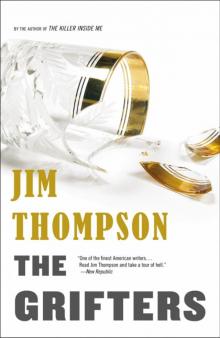 The Grifters
The Grifters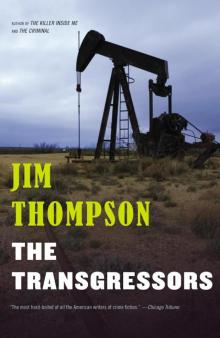 The Transgressors
The Transgressors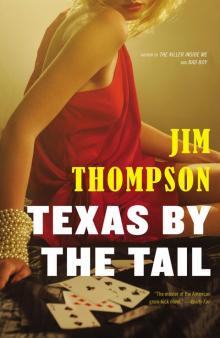 Texas by the Tail
Texas by the Tail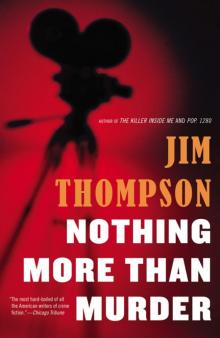 Nothing More Than Murder
Nothing More Than Murder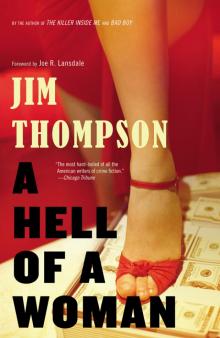 A Hell of a Woman
A Hell of a Woman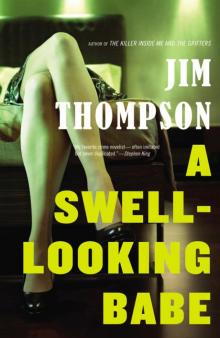 A Swell-Looking Babe
A Swell-Looking Babe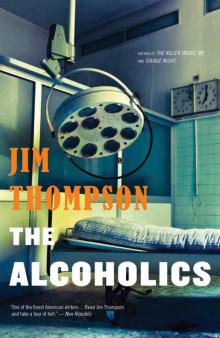 The Alcoholics
The Alcoholics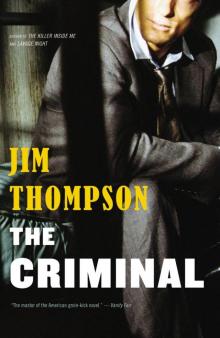 The Criminal
The Criminal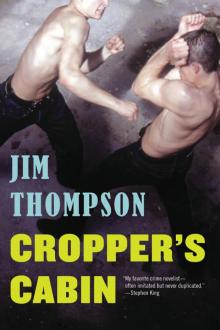 Cropper's Cabin
Cropper's Cabin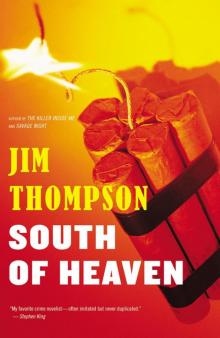 South of Heaven
South of Heaven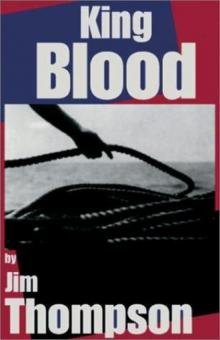 King Blood
King Blood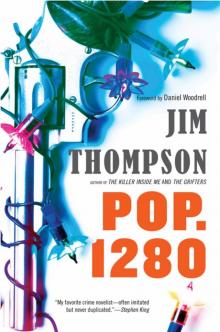 Pop. 1280
Pop. 1280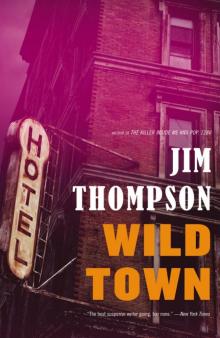 Wild Town
Wild Town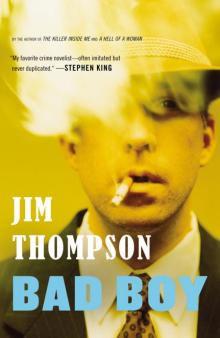 Bad Boy
Bad Boy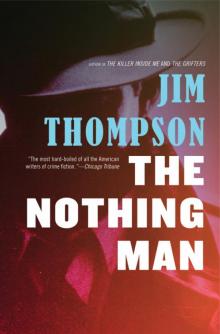 The Nothing Man
The Nothing Man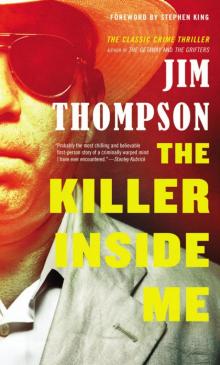 The Killer Inside Me
The Killer Inside Me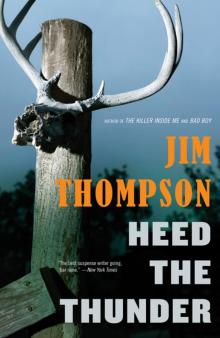 Heed the Thunder
Heed the Thunder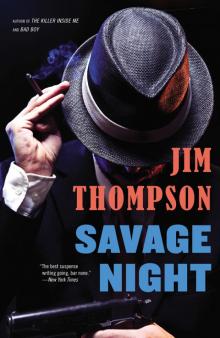 Savage Night
Savage Night Recoil
Recoil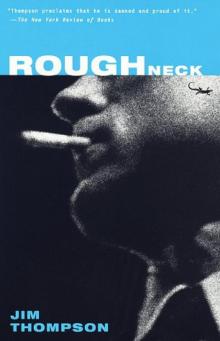 Roughneck
Roughneck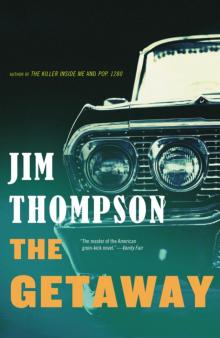 The Getaway
The Getaway